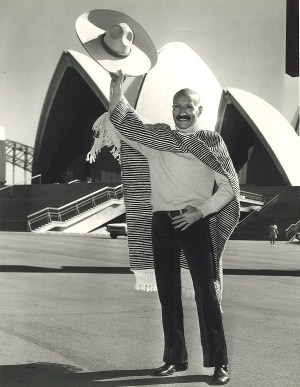About Guillermo
GUILLERMO KEYS-ARENAS (1928-2006)

Undoubtedly one of Guillermo Keys-Arenas' greatest achievements was his enormous contribution to Australian multi-culturalism as Artistic Director, (from 1979 until 1994) of the Folkloric Festivals, sponsored by Sydney Opera House and Shell. The Festivals were held first only in Sydney but later also established in other Capitals; with inexhaustible energy he directed them all.
A hands-on director; he was determined that each group should be truly representative of its community and display to the best advantage its unique cultural heritage. He worked with the groups individually to achieve a finely honed result; travelling even to remotest suburbs and beyond to goad amateur groups towards a standard of performance to which any professional company might lay claim. He advised them on every aspect of costuming, presentation and stage discipline while urging them towards higher standards. He made many aware of the deepest meaning of multi-culturalism and what benefits could be drawn from it, while encouraging descendants of immigrant families to reach a more profound understanding and appreciation of their own particular heritage and to take pride in its potential to enrich the lives of all Australians.
Guillermo's life was dance almost from the day he was born in El Ebano, Northern Mexico. From his earliest days he was obsessed with theatre, borrowing sheets from the laundry basket to make costumes and curtains for home displays. When the family moved to Mexico City, Guillermo aged seven was enrolled for his first dance lessons in the National Dance School at the Opera House (the Palacio de Bellas Artes). In 1945 he made his professional debut with the Ballet of Mexico City. His promise was soon noted and rewarded by grants from the Rockefeller Foundation, the British Council and the French Government enabling him to study ballet and modern dance in the USA, in Britain at Sadler's Wells (now Royal) Ballet School and in France at the Ballet School of the Paris Opera.
In Mexico for almost thirty years Guillermo danced and choreographed for ballet, film, television and opera. Despite being in such demand at home he also managed to fulfil many international engagements; however he is especially remembered for his eight year association as both Artistic Co-ordinator and Ballet Master of Ballet Folklorico of Mexico touring with it throughout the Americas, Europe and Australasia. On one of those tours he fell in love with Australia, and as a result returned here to live in 1974. He was naturalised in 1999; but proud of his heritage retained Mexican citizenship.
Guillermo's first engagement in Australia was as Ballet Master and Teacher for the Dance Company of New South Wales (now Sydney Dance Company). In 1975 he was commissioned to stage a suite of Mexican Dances for the folkloric dance group Dance Concert then in 1976 he became that group's Ballet Master and in 1978 its Artistic Director until the company disbanded four years later.
There was hardly a major dance company or school anywhere in the country which did not benefit from his expertise as teacher, lecturer or choreographer. At various times he worked with The Australian Ballet School, The Australian Ballet (most recently as a Guest Artist in Graeme Murphy's version of THE NUTCRACKER) with all the State Dance Companies, plus the Victorian College of the Arts, N.I.D.A., University of Western Sydney and numerous independent dance schools. He choreographed for Sydney Dance Company and for five Australian Opera productions, beside engagements with The Royal New Zealand Ballet and the University of Shanghai. For over a decade many theatre-goers looked forward to his appearance in the Christmas show at the Sydney Opera House as the cheeky gnome, Santa's Little Helper. His cultural interests were wide embracing all types of music, theatre, film and art, attending as many performances and exhibitions as his busy schedule would allow.
Guillermo although small in stature was huge in personality. He loved the old fashioned virtues of courtesy and respect for others but was a stern perfectionist in his demand for better dancing.
Words by Harry Haythorne


